Introduction: In this article, Gena Philibert-Ortega searches old newspapers to learn more about the Olympic Summer Games. Gena is a genealogist and author of the book “From the Family Kitchen.”
The Games of the XXXI Olympiad, the Summer Olympics, have started! From now until 21 August 2016, more than 11,000 athletes from 206 counties are competing in 28 sports for the gold in Rio de Janeiro, Brazil. How much do you know about the history of the summer games? Here are five facts gleaned from historical newspapers to get you ready for the competition.
1) The first modern Olympic Summer Games were held in April 1896 in Athens, Greece.
The original Olympic Games were held in Ancient Greece, beginning in the 8th century BC. When the games were revived in 1896, Athens, Greece, was chosen as the symbolic host for the first modern Olympics. Athletes competed in events like cycling, fencing, gymnastics, shooting, swimming, tennis, weightlifting and wrestling.
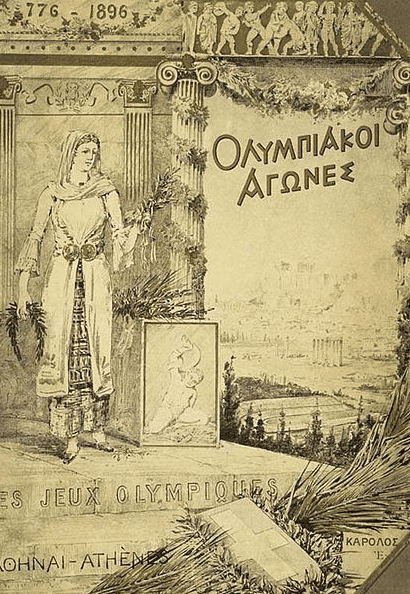
While 1896 marked the first modern games, not everything surrounding those games was modern. This 1896 Massachusetts newspaper article points out an important detail about the actual dates of that year’s Olympic Games. Unlike most of the Western World, who had switched to the Gregorian calendar, Greece had not made the switch yet – so the Olympics were “expected to begin on April 26 and to be continued for ten days, closing May 5, dates corresponding to April 5 to 15 in the old style…” The term “old style” referred to the Julian calendar in use in Greece until 1923.
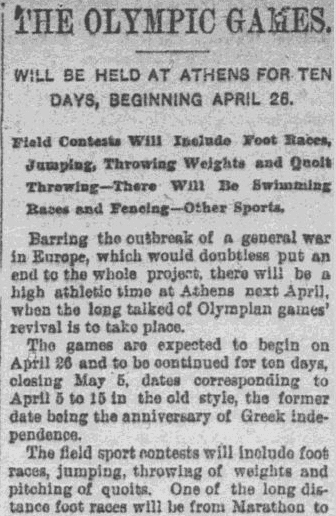
2) The Olympics are sometimes cancelled.
Every four years we celebrate another Olympic Summer Games, but there have been times in the history of the modern Olympics when the games have been cancelled.
The 1916 Summer Olympics was to be held in Berlin but was cancelled due to World War I. Despite the cancellation, planning for the 1920 games started even though the Olympic Committee was not going to meet again until the war was over. Because of the war hostilities, there was hesitation over whether the games would include all countries.
In this 1916 Massachusetts newspaper article, Baron Pierre de Coubertin, president of the International Olympic Games Committee, was asked whether the allied countries would want to compete against the Germans and Austro-Hungarians in 1920. He replied:
It is impossible to say what the state of international feeling will be four years hence. It is possible that Germans and Austrians may not be invited to participate.
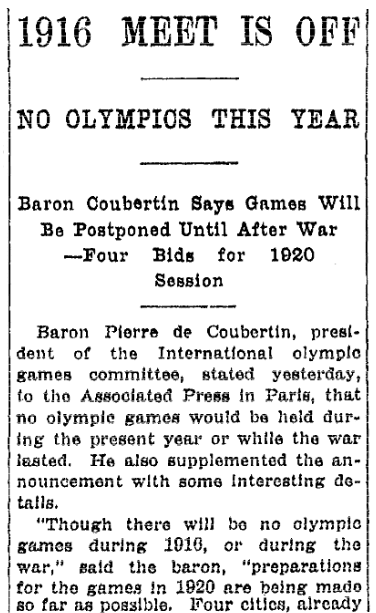
As it turned out, Germany and Austria were indeed banned from the 1920 Summer Olympics held in Antwerp, Belgium. (Germany would continue to be banned from the Olympics until 1925.) Not everyone outside of those two countries agreed with the ban.
This 1920 New Jersey newspaper article argues that:
It has always been our understanding that the idea of the Olympic sports was to bring all the nations of the world together and have every nation on friendly terms with every other nation. We cannot see how this can be done by eliminating the Germans and Austrians. It certainly won’t help their feeling toward the rest of the world.
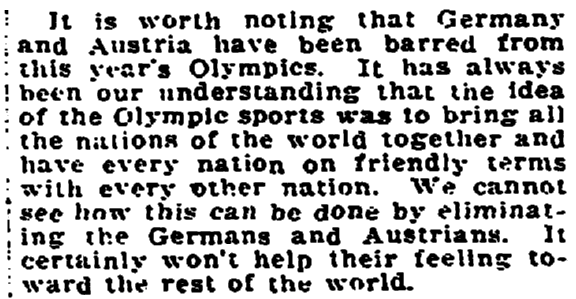
World War I was not the only time the Olympics would be cancelled because of war. The Olympic Games of 1940 and 1944 were cancelled as well, due to WWII.
3) The modern torch relay was introduced at the 1936 games.
The 1936 Olympics, held in Berlin, Germany, included something new: a relay was introduced that brought the lighted torch from Olympia, Greece, to the Olympic cauldron in Berlin to light the eternal flame for the games, something modern viewers of the Olympics have no doubt seen as part of the opening ceremonies.
This 1936 Texas newspaper article reports that 3,000 youths and men will carry the torch on an “1,800-mile journey through Greece, Bulgaria, Jugoslavia, Hungary, Austria, Czechoslovakia and Germany.” Once it arrived in Berlin, Spyros Louis – who competed in the first modern games of 1896 – carried the torch into the Olympic Stadium.
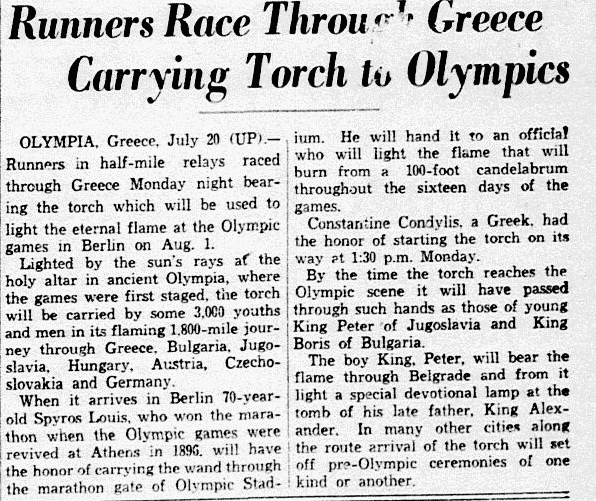
4) Women weren’t allowed to compete in the first modern Olympic Games in 1896.
Since 1991, any new sport introduced to the Olympics must feature a women’s event – but that was not always so. In one of my previous GenealogyBank Blog articles, Women’s History Month: 4 Sporting Women, I wrote about Margaret Ives Abbott who won the 9-hole golf tournament at the 1900 Paris Olympic Games. However, because of the disorganization of those games, she didn’t even know that she was competing in the Olympics. She unknowingly was participating in one of the only two events in those 1900 Olympic Games that allowed women: golf and tennis.
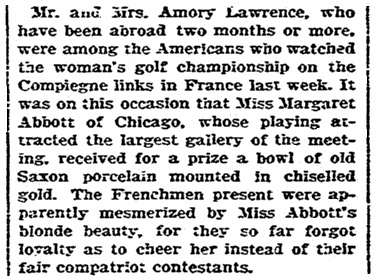
The first modern Olympic Summer Games of 1896 didn’t allow women to compete in any sporting event at all. A Greek woman, Stamata Revithi, defied the ban and unofficially ran the marathon in the 1896 games the day after the men ran the race, 88 years before women would be allowed to officially run the marathon event in the Olympic Games.*
5) Some of the events in past Summer Olympics have been unusual – even downright odd.
What are your favorite summer Olympic events? Track and Field? Figure Skating? Swimming? It probably comes as no surprise that Olympic events have changed over the years. To modern fans, some previous events from 20th century Olympic Games may seem downright odd. Ballooning, auto racing, pigeon shooting, tug-of-war, and even art competitions have all been featured in past Olympic games. In 1912 the Olympics were held in Sweden and included equestrian sports like the event described here in this 1912 Michigan newspaper article.
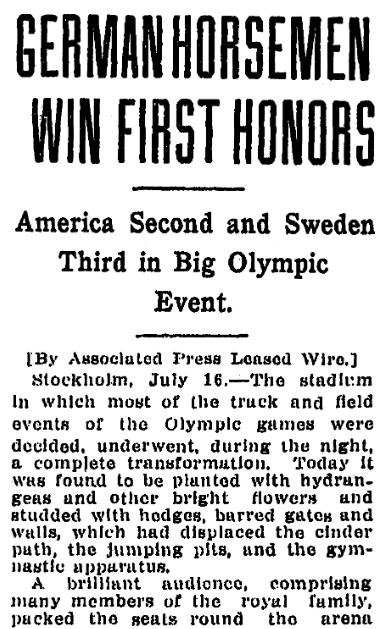
You may have skimmed over the word “art” in my previous paragraph. After all, art is not a competitive sport, right? It might not be – but nonetheless there was an art competition in the Olympics. In 1912, American Walter Winans, who also took home a medal for shooting, won a gold medal for a sculpture he cast called An American Trotter.
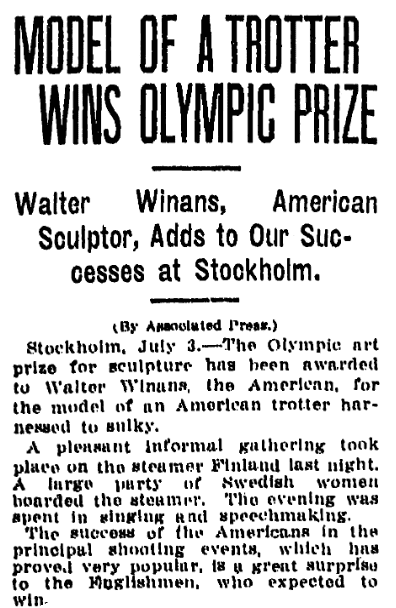
Was the art competition some sort of fluke that occurred just that one year? No, art competitions were part of the Olympics until 1952. The 151 medals awarded for art categories over the four decades of the competition were subsequently stricken from the Olympic record and “do not count towards countries’ current medal counts.”**
Let The Games Begin!
Ready to watch some Olympic action? It’s time to root for your favorite athletes and events. The Olympics have a rich history and once again it’s time to celebrate the best the world has to offer.
Note: An online collection of newspapers, such as GenealogyBank’s Historical Newspaper Archives, is not only a great way to learn about the lives of your ancestors – the old newspaper articles also help you understand American history and the times your ancestors lived in, and the news they talked about and read in their local papers. Did any of your ancestors participate in the Olympic Games? Please share your stories with us in the comments section.
——————————-
* Coleman, Isobel. How Women Have Already Triumphed at the 2012 Olympics. The Atlantic. http://www.theatlantic.com/international/archive/2012/07/how-women-have-already-triumphed-at-the-2012-olympics/260301/
** Stromberg, Joseph. When the Olympics Gave Out Medals for Art. Smithsonian. http://www.smithsonianmag.com/arts-culture/when-the-olympics-gave-out-medals-for-art-6878965/#AIbliQIHGItjmDys.99
